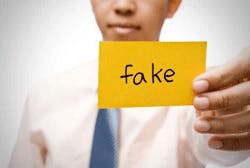Like this article? Sign up for our enews blasts by clicking here.
The bill was called the Foreign Counterfeit Merchandise Prevention Act (HR 6654). It was the descendant of an earlier bill introduced in March by Rep. Ted Poe (R-TX). That bill was H.R. 4216, and it was the subject of hearings in a House Judiciary subcommittee. The bill gives the CBP the authority to share information and samples of potentially counterfeit goods to intellectual property rights (IPR) holders, allowing them to assist in determining whether the goods are legitimate. The bill includes a provision giving priority to “critical merchandise,” which includes “motor vehicle equipment.”
The circulation of counterfeit auto parts has been a serious problem here for many years. As recently as last October, the Department of Transportation's National Highway Traffic Safety Administration (NHTSA) issued a consumer safety advisory to alert vehicle owners and repair professionals to the dangers of counterfeit air bags. The particular concern here was when "crash cars" are repaired. The air bags the NHTSA cited look nearly identical to certified, original equipment parts — including bearing the insignia and branding of major automakers. Not surprisingly, though, NHTSA testing showed consistent malfunctioning ranging from non-deployment of the air bag to the expulsion of metal shrapnel during deployment.
A special report produced by the MEMA Brand Protection Council in January 2009 cited a Federal Trade Commission estimate that counterfeiting costs the global motor vehicle parts industry $12 billion a year and $3 billion in the United States alone. Companies such as ACDelco have counterfeit parts information sections on their websites, for example. “The problem grows larger every year, due in large part to counterfeiters’ expanding use of the Internet to distribute fake parts,” says Bill Long, president and chief operating office, AASA.
The CBP has, itself, administratively tried to respond to the intensifying counterfeiting problem, which spans a number of sectors beyond auto parts, of course, particularly software and drugs. The agency issued an interim final rule (which expires with the passage of the upcoming CBP reauthorization bill) last summer, which attempted to do some of what is in the Poe bill, although not as aggressively. The CBP rule has a longer waiting period before information sharing between the CBP and the actual trademark owner in the U.S. can take place once counterfeit goods are detained at a port.
Of course, a significant percentage of counterfeit goods originate in China. The MEMA special report puts that percentage at 80-plus with regard to auto parts. So it is worth mentioning a side issue — concern in Congress about Chinese companies buying up U.S. auto parts suppliers. The chief concern is strategic U.S. technology, particularly applicable to defense, leaving these shores and going to China. The other concern is a new, perhaps more viable, conduit for counterfeit parts to get from China to the U.S.
The current Chinese auto parts controversy revolves around Wanxiang America, which bought bankrupt battery manufacturer A123, beating out Johnson Controls in the process. Wanxiang America is the U.S. subsidiary of one of the world’s biggest auto parts manufacturers. The Strategic Materials Advisory Council, a group of former U.S. military leaders and industry specialists, lobbied the Committee on Foreign Investment in the United States (CFIUS) to block the sale on the grounds that the United States would now be dependent on China for advanced battery technology.
Subscribe to Aftermarket Business World and receive articles like this every month….absolutely free. Click here.


